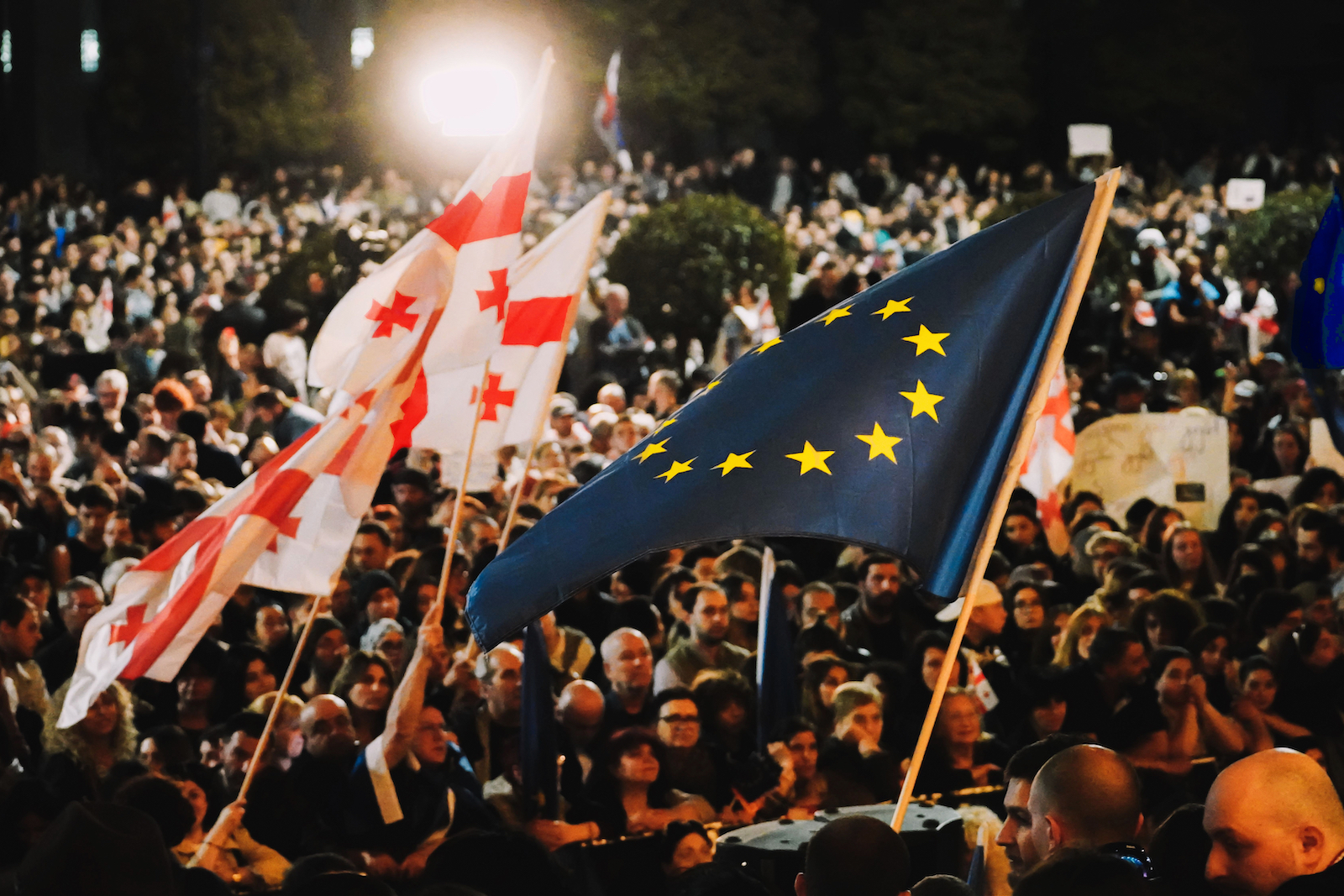
Putin-Style Law Leaves Georgia at a Crossroads
Attempts to reintroduce a ‘foreign agent’ law in Georgia have left the country at a crossroads, imposing tough restrictions on civil society and triggering fresh protests, some violent. This situation has many questioning the future direction of the former Soviet state. Will Georgia look East, towards Vladimir Putin and Russia, or will it pivot towards the West and potential EU membership, as many younger Georgians hope?
A stark reminder of this pivotal moment came this week when tens of thousands of people took to the streets, protesting a controversial ‘Putin-style’ foreign agent law being pushed through the Georgian parliament by the ruling Georgian Dream party. These protests, like previous ones against the legislation, have been dominated by Georgia’s younger generation, who have once again taken to the streets of Tbilisi to voice their concerns.
The draft law, which has been little publicized in the West, has sparked some of the largest protests since Georgia gained its independence from the Soviet Union in 1991. The government insists it will push ahead with the legislation—it tried to pass the law last year—and Georgian Prime Minister Irakli Kobakhidze aims to pass the bill later this week.
However, the fresh demonstrations have led to new demands for the government to abandon the plan, which would force NGOs, campaign groups, and media outlets to register as “foreign agents” if they receive more than 20% of their funding from abroad. Under the proposed law, NGOs, media, and journalists would have to register within two months as “organisations pursuing the interests of a foreign power” instead of “agents of foreign influence.”
The Georgian government has accused NGOs of working for foreign governments and plotting a revolution, but opponents say the proposals are reminiscent of President Putin’s moves to stifle dissent and suffocate civil society in Russia. Back in December, the EU granted Georgia candidate status, raising the hopes of the four-in-five Georgians who consistently tell pollsters they want to join the 27-strong bloc.
Georgia has sought a rapprochement with Europe since its war with Russia in 2008. However, some believe that Russia’s recent presidential elections, which saw Vladimir Putin claim victory to serve a fifth term as leader, could trigger a Ukraine-style invasion of Georgia. Some liken the Georgian legislation to Russia’s 2012 “foreign agents” law, which has been used to hound critics of the Russian regime.

The EU has not been silent on the new Georgian law. The EU Commission states that “intimidation, threats and physical assaults against civil society activists, politicians and journalists are unacceptable.” Nabila Massrali, EU spokesperson for Foreign Affairs and Security Policy, added, “The EU urges the authorities to ensure that fundamental rights of all citizens are protected and those acts are investigated.”
Speaking on Monday at a press briefing, EC foreign affairs spokesman Peter Stano was quizzed by reporters about the current situation and said, “What we have seen these last few days in Georgia is a really impressive commitment by the vast majority of people for a new path for their country and we now expect the Government to mirror this desire and passion. However, what we have also seen in the last few days is violence, physical assault and intimidation against protestors and these brutal actions must be strongly condemned.”
He said the EC called on the Georgian government to “ensure the right to protest and to investigate all violations. “We expect those responsible for the violence to be brought to justice. The EU and member states are watching the situation very closely and member states have also spoken out on this is.”
Asked by journalists about possible sanctions against Georgia, he said, “This is not something for us to decide but member states themselves. But we hope the authorities there will to go back towards the EU path and deliver on their commitments.”
On April 25, the European Parliament adopted a resolution calling on the Georgian parliament to halt the adoption of the draft law, which it believes breaches “EU values and principles.” The Parliament said it “strongly condemned” the re-introduction of the controversial draft law on “transparency of foreign influence” in a resolution adopted with 425 votes in favor, 25 against, and 30 abstentions. MEPs said the law would impose “debilitating restrictions.” The Parliament reiterated that the bill is incompatible with EU values and principles and runs against Georgia’s EU membership ambitions.
Earlier in April, the Georgian parliament passed the so-called “transparency of foreign influence” law in its first reading. It could lead, possibly, to sanctions against NGOs and others, “seriously restricting media and civil society’s ability to operate freely,” according to MEPs. MEPs are urging the Georgian parliament to halt the adoption of the law, saying they are concerned about reports of riot police using disproportionate force to disperse protesters. They have called on the Georgian authorities to investigate any such force and hold accountable those responsible.
While the EU Parliament has expressed its unwavering support for the Georgian people’s European aspirations, it has also stressed that EU accession negotiations “should not be opened as long as such a law is part of Georgia’s legal order.” Deputies also demand that the Commission and EU countries assess the impact of the draft law on the EU’s role as a donor in Georgia.
The EPP Group, the largest political group in the European Parliament with 177 members, has joined others in the assembly in saying the Georgian government is taking inspiration from similar Russian legislation that has been used to stifle civil society, independent media, and political opposition.
EPP member Miriam Lexmann, who negotiated the resolution on behalf of her group, says the EU accession negotiations with Georgia should not be opened if the
‘foreign agents’ law is adopted.
She says, “The law violates the European Commission’s recommendations on Georgia’s candidate status, is incompatible with EU values and democratic principles, and runs against the Euro-Atlantic aspirations of the Georgian people, closely mirroring Putin’s law. Instead of genuinely strengthening transparency and fighting against the malign influence of the Kremlin, the proposed law will undermine the freedom of civil society and the media,” stresses Lexmann.
“Georgia needs de-Bidzinization laws, not Russian laws in a country which wants to join the EU,” adds Rasa Juknevičienė, the EPP Group Vice-Chair in charge of Foreign Affairs, referring to the Georgian oligarch and former prime minister with ties to Russia, Bidzina Ivanishvili. He founded the ruling Georgian Dream party, which is, according to the EPP, attempting to reverse the country’s pro-European path. “The Kremlin has become very active in the EU, but also in the EU’s close neighbourhood.”
Turning to the ongoing protests and the belief that Georgia now stands at a critical point in its history, Rasa Juknevičienė says, “We fully support those protesting against the foreign agents law, as it is this law that is leading the country towards Russia and away from the EU.”
Further reaction to the unrest comes from senior German center-right MEP David McAllister, who chairs the EU Parliament’s influential foreign affairs committee. On Monday, during an interview, he told me, “Georgia is at a crossroads. The Georgian people are defending freedom, democracy, and their Euro-Atlantic integration by demonstrating against the draft foreign agent law which jeopardises this future. The Georgians do not want to be part of the Russian orbit. The government in Tbilisi must de-escalate immediately by refraining from any further use of force against peaceful protesters or members of the opposition and withdraw the controversial draft law.”
Ian Bond, with the Centre for European Reform, told me in an interview, “The paradox of Georgia is that it has the most pro-EU population in the former Soviet space, and has come further than any other Eastern European country in tackling corruption, but it now has one of the most anti-EU governments, controlled from behind the scenes by an oligarch who made his money in Russia in the 1990s. The EU has to find a way to help those who want Georgia to become a modern European democracy, not an authoritarian satellite of Russia.”
